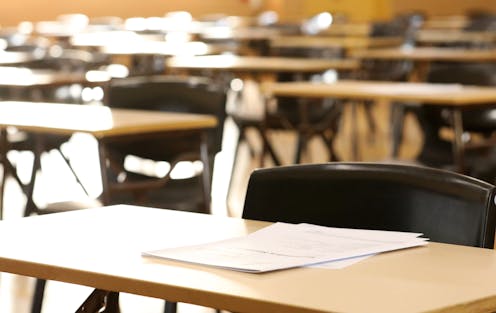
After more than a week of uncertainty, we now know the Victorian Certificate of Education (VCE) results. Not for Victoria’s Year 12 students who sat the exams, but the Victorian Curriculum and Assessment Authority responsible for running them. And the results are not good.
We now have the list of Victorian Year 12 exams that were compromised when questions and exam materials were accidentally posted online before students sat their assessments.
The exams include major subjects such as mathematics, biology, economics and legal studies. They also include ancient history, dance, drama, food studies, geography, media, physical education and English.
The new head of the assessment authority Marcia Devlin said information revealed about English exams was already in the public domain and didn’t contain any of the exam questions.
What does this list, and the ongoing confusion, mean for students?
What has happened so far?
Last week, the Victorian government confirmed 56 exams had been affected by a breach this year. This is out of 116 exams for 2024.
We also saw Kylie White, the head of the Victoria’s assessment authority, resign after only 12 months in the job.
The breach happened when exam questions were mistakenly published online before students did the exams, in a “hidden” section of sample assessments.
Victorian Education Minister Ben Carroll has apologised for the error and has ordered a review into what happened. On Wednesday, he said:
I would like to again apologise to every single student, parent, carer that have been affected by this publication.
The bungle has led to concerns from schools some students could lose marks or get an unfair advantage in the process.
Exams are now being marked and the results are due to be released on December 12.
What happens now?
This is the second consecutive year of VCE testing turmoil. In 2023, thousands of students sat exams that contained errors. In March 2024, a review into the exams made six “high-level recommendations” to improve the exam process.
But more changes are obviously needed. While the new review will seek to address these issues for next year, current Year 12 students and the community are anxious to know what happens next.
The assessment authority will use a process called “anomalous grade checking”.
It will review student responses in the 56 compromised VCE exams and identify where exam errors might have affected student marks. If student marks have been affected, the process can invalidate “faulty” questions or can award all students who sat the exam question a full mark.
How can we support students?
For Year 12 students and their families, VCE exams are already a time of considerable stress. So, supporting Year 12 students as they wait for their results is the most important thing.
Carroll has previously said the exam authority will ensure “all students are treated fairly and no student is disadvantaged”.
But students with specific concerns should speak first with their teachers, as all schools have been in regular contact with the assessment authority.
It is also a useful time to put Year 12 results and ATAR scores in context.
While these exam marks are important, they are certainly not all that matters. Completing Year 12 is an immense achievement itself. For many, this will be in spite of significant personal hardship or disadvantage.
Also, learning is a lifelong endeavour that extends far beyond school. Year 12 scores might measure performance at school, but they do not define or predict future success or happiness in life.
Focusing only on narrow definitions of success can condition current and future Year 12 students to think these marks are all that matters. Amid the current (and deserved) close scrutiny on these exams, it is also important to remind students they are always more than their exam scores.
Read more: 'Practically perfect': why the media's focus on 'top' Year 12 students needs to change
What are the compromised VCE subjects?
Arts and humanities
English and languages
Science and mathematics
Health and physical education, design and technologies
Business and economics
Digital technologies
Vocational and technology studies
Steven Lewis receives funding from the Australian Research Council.
This article was originally published on The Conversation. Read the original article.







